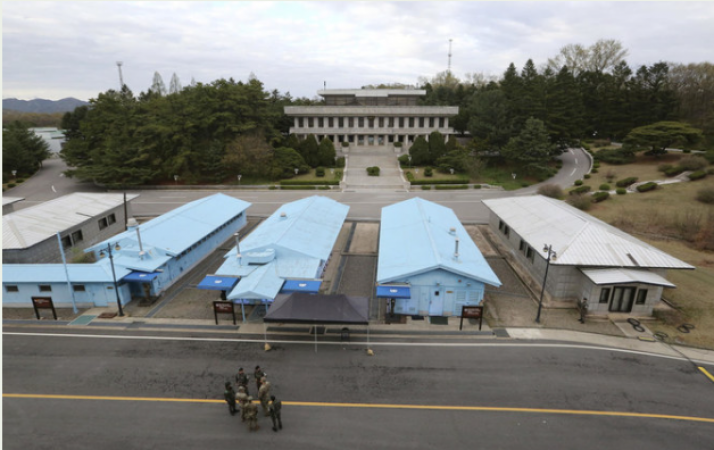
Seoul: In the midst of rising tensions over North Korea's nuclear program, the heavily guarded border between South and North Korea has been breached by an American, according to the US-led UN Command in charge of the region.
The US citizen entered the North without permission while on a tour of the Korean border village of Panmunjom, according to a tweet from the UN Command.
He is currently in North Korean custody, according to the statement, and the UN Command is coordinating with North Korean authorities to put an end to the incident. No other information about the individual or his reason for crossing the border was provided.
Also Read: Global heat waves are merciless, and record temperatures are expected in Europe
The border incident was not immediately covered by North Korea's state media.
Rarely do Americans or South Koreans defect to North Korea, but since the 1950–1953 Korean War, more than 30,000 North Koreans have fled to South Korea to escape political repression and economic hardships at home.
Since its establishment at the end of the Korean War, Panmunjom, which is located inside the 248-kilometer (154-mile) long Demilitarized Zone, has been jointly supervised by North Korea and the UN Command. There have been instances of bloodshed and gunfire there, but it has also served as a location for numerous talks and a well-liked tourist destination.
Panmunjom has attracted tourists from both sides who want to see what the final frontier of the Cold War looks like because of its blue huts that are built on top of concrete slabs that form a military demarcation line. At Panmunjom, no civilians reside.
Before the pandemic, when South Korea restricted gatherings to contain COVID-19, tours to the village's southern side reportedly drew about 100,000 tourists annually. Last year, the tours were fully resumed.
As one of their comrades ran toward freedom in November 2017, North Korean soldiers fired 40 rounds. The soldier was struck five times before he was discovered beneath a mound of leaves on Panmunjom's southern side. He made it through and is now in South Korea.
Also Read: Taliban engagement call from a Tory politician was heavily criticized
Two American army officers were killed by North Korean soldiers brandishing axes at Panmunjom in August 1976, which is considered to be the site of the most famous incident there. The US officers were dispatched to cut down a 40-foot (12-meter) tree that was blocking a checkpoint's view. In response to the attack, Washington sent nuclear-capable B-52 bombers toward the demilitarized zone (DMZ) to intimidate North Korea.
The armistice that ended the Korean War was also signed in Panmunjom. The Korean Peninsula is currently technically in a state of war because that armistice has not been replaced by a peace treaty. About 28,000 American soldiers are still stationed in South Korea.
During the Cold War, a few US soldiers crossed the demilitarized zone (DMZ) and fled to North Korea, including Charles Jenkins, who deserted his army post in South Korea in 1965. He married a Japanese nursing student who had been kidnapped by North Korean agents and appeared in North Korean propaganda movies. 2017 saw his passing in Japan.
Some Americans have allegedly entered North Korea from China in recent years, leading to their arrest in North Korea. They were later found guilty of spying, subversion, and other anti-state crimes, but they were frequently set free after the US dispatched high-profile missions to secure their release.
During a brief thaw in tensions between the longtime foes, North Korea freed three American prisoners in May 2018: Kim Dong Chul, Tony Kim, and Kim Hak Song. They flew back to the United States on a plane with Secretary of State Mike Pompeo at the time. North Korea claimed to have expelled American Bruce Byron Lowrance later in 2018.
The North Korean leader Kim Jong Un and the then-President Donald Trump were negotiating a nuclear deal at the time of the releases, but the high-stakes negotiations ended in 2019 due to disagreements over US-led sanctions against North Korea.
Their freedom stood in stark contrast to Otto Warmbier's, an American university student who passed away in 2017 just days after being freed from captivity in North Korea after spending 17 months there. Warmbier and other American prisoners previously held in the North were held there on suspicion of a range of offenses, including subversion, anti-state activity, and espionage.
North Korea is charged with using foreign detainees to force diplomatic concessions, according to the United States, South Korea, and other countries. After their release, some foreigners claimed that their confessions of guilt had been coerced while they were in North Korean custody.
Also Read: First UN Security Council meeting on risks from AI
High tensions over North Korea's barrage of missile tests since the beginning of last year were present at the time of Tuesday's border crossing. In an effort to deter North Korea, the US earlier on Tuesday sent a nuclear-armed submarine to South Korea for the first time in decades.